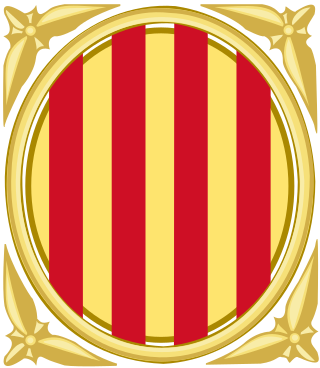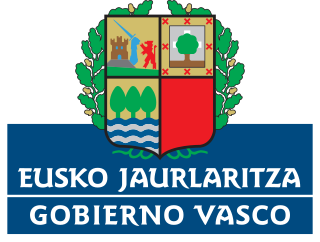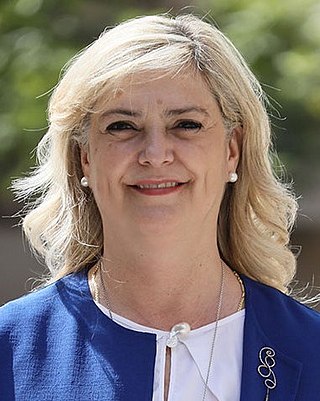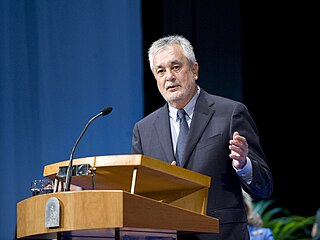
Josep Bargalló i Valls is a Spanish teacher and politician from Catalonia and the current Minister of Education of Catalonia.

The government of Pasqual Maragall was formed on 22 December 2003 following the latter's election as President of the Government of Catalonia by the Parliament of Catalonia on 16 December and his swearing-in on 18 December, as a result of the Socialists' Party of Catalonia (PSC), Republican Left of Catalonia (ERC) and Initiative for Catalonia Greens–United and Alternative Left (ICV–EUiA) being able to muster a majority of seats in the Parliament following the 2003 Catalan regional election. It succeeded the sixth Pujol government and was the Government of Catalonia from 22 December 2003 to 29 November 2006, a total of 1,073 days, or 2 years, 11 months and 7 days.

The Executive Council of Catalonia or the Executive Government of Catalonia is the executive branch of the Generalitat of Catalonia. It is responsible for the political action, regulation, and administration of the government of the autonomous region.

The fifth government of Jordi Pujol was formed on 12 January 1996 following the latter's reelection as President of Catalonia by the Parliament of Catalonia on 16 December 1995 and his swearing-in on ?, as a result of the Convergence and Union (CiU) alliance emerging as the largest parliamentary force at the 1995 Catalan regional election, though managing to lose the absolute majority for the first time since 1980. It succeeded the fourth Pujol government and was the Government of Catalonia from 12 January 1996 to 29 November 1999, a total of 1,366 days, or 3 years, 10 months and 17 days

The Department of Health is the department of the Basque Government responsible for the public health care system of the Basque Autonomous Community.

The Puigdemont Government was the regional government of Catalonia led by President Carles Puigdemont between 2016 and 2017. It was formed in January 2016 after the resignation of Puigdemont's predecessor Artur Mas and it ended in October 2017 with the imposition of direct rule following the Catalan declaration of independence.

The first government of Ximo Puig was formed on 30 June 2015, following the latter's election as President of the Valencian Government by the Corts Valencianes on 25 June and his swearing-in on 28 June, as a result of the Socialist Party of the Valencian Country (PSPV–PSOE) and Commitment Coalition (Compromís) being able to muster a majority of seats in the Parliament with external support from We Can (Podemos) following the 2015 Valencian regional election. It succeeded the Fabra government and was the Valencian Government from 30 June 2015 to 17 June 2019, a total of 1,448 days, or 3 years, 11 months and 18 days.

The second government of Susana Díaz was formed on 18 June 2015 following the latter's reelection as President of Andalusia by the Parliament of Andalusia on 11 June and her swearing-in on 14 June, as a result of the Socialist Party of Andalusia (PSOE-A) emerging as the largest parliamentary force at the 2015 Andalusian regional election. It succeeded the first Díaz government and was the Government of Andalusia from 18 June 2015 to 22 January 2019, a total of 1,314 days, or 3 years, 7 months and 4 days.

The first government of Juanma Moreno was formed on 22 January 2019, following the latter's election as President of the Regional Government of Andalusia by the Parliament of Andalusia on 16 January and his swearing-in on 18 January, as a result of the People's Party (PP) and Citizens (Cs) being able to muster a majority of seats in the Parliament with external support from Vox following the 2018 Andalusian regional election. It succeeded the second Díaz government and was the Regional Government of Andalusia from 22 January 2019 to 26 July 2022, a total of 1,281 days, or 3 years, 6 months and 4 days.

The second government of Ximo Puig was formed on 17 June 2019, following the latter's election as President of the Valencian Government by the Corts Valencianes on 13 June and his swearing-in on 15 June, as a result of the Socialist Party of the Valencian Country (PSPV–PSOE) emerging as the largest parliamentary force at the 2019 regional election. It succeeded the first Puig government and was the Valencian Government from 17 June 2019 to 19 July 2023, a total of 1,493 days, or 4 years, 1 month and 2 days.

The third government of Guillermo Fernández Vara was formed on 2 July 2019, following the latter's election as President of Extremadura by the Assembly of Extremadura on 25 June and his swearing-in on 27 June, as a result of the PSOE emerging as the largest parliamentary force at the 2019 Extremaduran regional election by securing an absolute majority of seats in the Assembly. It succeeded the second government of Guillermo Fernández Vara and was the Government of Extremadura from 2 July 2019 to 21 July 2023, a total of 1,480 days, or 4 years and 19 days.

The second government of Fernando López Miras was formed on 1 August 2019, following the latter's election as President of the Region of Murcia by the Regional Assembly of Murcia on 26 July and his swearing-in on 29 July, as a result of the People's Party (PP) allying itself with Citizens (Cs) and mustering the external support from Vox in exchange for policy compromises following the 2019 Murcian regional election. It succeeded the first López Miras government and has been the incumbent government of the Region of Murcia since 1 August 2019, a total of 1,844 days, or 5 years and 17 days.

Joan Ignasi Elena i Garcia is a Spanish lawyer and politician from Catalonia, former member of the Parliament of Catalonia and the current Minister of the Interior of Catalonia.

Francesca Violant Cervera i Gòdia is a Spanish politician from Catalonia, former member of the Parliament of Catalonia and the current Minister of Social Rights of Catalonia.

The government of Pere Aragonès was formed on 26 May 2021 following the latter's election as President of the Government of Catalonia by the Parliament of Catalonia on 21 May and his swearing-in on 24 May, as a result of Republican Left of Catalonia (ERC) and Together for Catalonia (Junts) being able to muster a majority of seats in the Parliament with external support from the Popular Unity Candidacy (CUP) following the 2021 Catalan regional election. It succeeded the Torra government and was the Government of Catalonia from 26 May 2021 to 12 August 2024, a total of 1,174 days, or 3 years, 2 months and 17 days.

The first government of José Antonio Griñán was formed on 24 April 2009 following the latter's election as President of Andalusia by the Parliament of Andalusia on 22 April and his swearing-in on 23 April, as a result of the resignation of the former president, Manuel Chaves, upon his nomination as Third Deputy Prime Minister in the second government of José Luis Rodríguez Zapatero. It succeeded the sixth Chaves government and was the Government of Andalusia from 24 April 2009 to 7 May 2012, a total of 1,109 days, or 3 years and 13 days.

The government of Salvador Illa was formed on 12 August 2024 following the latter's election as President of the Government of Catalonia by the Parliament of Catalonia on 8 August and his swearing-in on 10 August, as a result of the Socialists' Party of Catalonia (PSC) being able to muster a majority of seats in the Parliament with external support from the Republican Left of Catalonia (ERC) and Commons Unite following the 2024 Catalan regional election. It succeeded the Aragonès government and has been the incumbent Government of Catalonia since 12 August 2024, a total of 5 days.

















